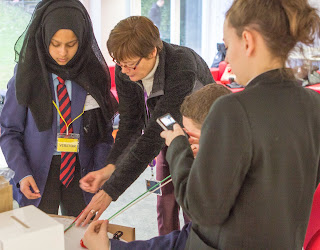NTU Students in Classrooms – gain practical experience with our rewarding opportunities to work in local schools and colleges
Want to get involved in a rewarding scheme but can't drop that part time job?
If this applies to you why not think about applying for one
of our Students in Classrooms schemes!
NTU Students in Classrooms offer a range of opportunities to
work with young people in local schools, colleges and here at the University.
There are three schemes:
Associates work alongside classroom teachers in:
- Primary schools
- Secondary schools
- Colleges
The aim of the Associates scheme is to provide positive role
models and help to raise aspirations and attainment. Associates work with groups
of learners, or on a one to one basis supporting pupils with things such
as literacy activities or reading.
Associates may also get the opportunity to assist with some non-teaching
aspects such as planning and preparation of lessons.
 Mentors work on a one-to-one basis with students between the
ages of 13 - 17 providing advice and guidance on:
Mentors work on a one-to-one basis with students between the
ages of 13 - 17 providing advice and guidance on:- Routes
into higher education
- Revision
& exam technique
- Planning
& self-management skills
- Motivation, self-confidence and much more.
The scheme has an overall aim to help to increase attainment
levels and raise aspirations towards higher education. This is a good way to
engage personally with students and know you're providing a service that may
change lives.
 Nottingham Trent University delivers a wide range of
activities and events working in schools and colleges, as well as engaging
parents, carers and members of the general public.
Nottingham Trent University delivers a wide range of
activities and events working in schools and colleges, as well as engaging
parents, carers and members of the general public.
Ambassadors get involved with:
- Raising
awareness of post 16 opportunities and NTU
- Supporting
our outreach team with classroom activities out in schools and colleges
- Helping
at events such as University Open days & subject taster days
Overall, being a Student Ambassador involves spreading information and acting as a positive
role model for the University. Students in Classrooms are looking for enthusiastic students
who are proactive and will be fully committed to the scheme they apply for.
To find out more about each scheme, the commitment involved
and the rates of pay, please visit: www.ntu.ac.uk/studentsinclassrooms
Please note that
interested students must attend an awareness raising meeting to be eligible to
apply. The meetings will be taking place across all three NTU campuses at
the start of the next term, dates are available on the Students in Classrooms
website.
If you have any questions, please contact studentsinclassrooms@ntu.ac.uk.







